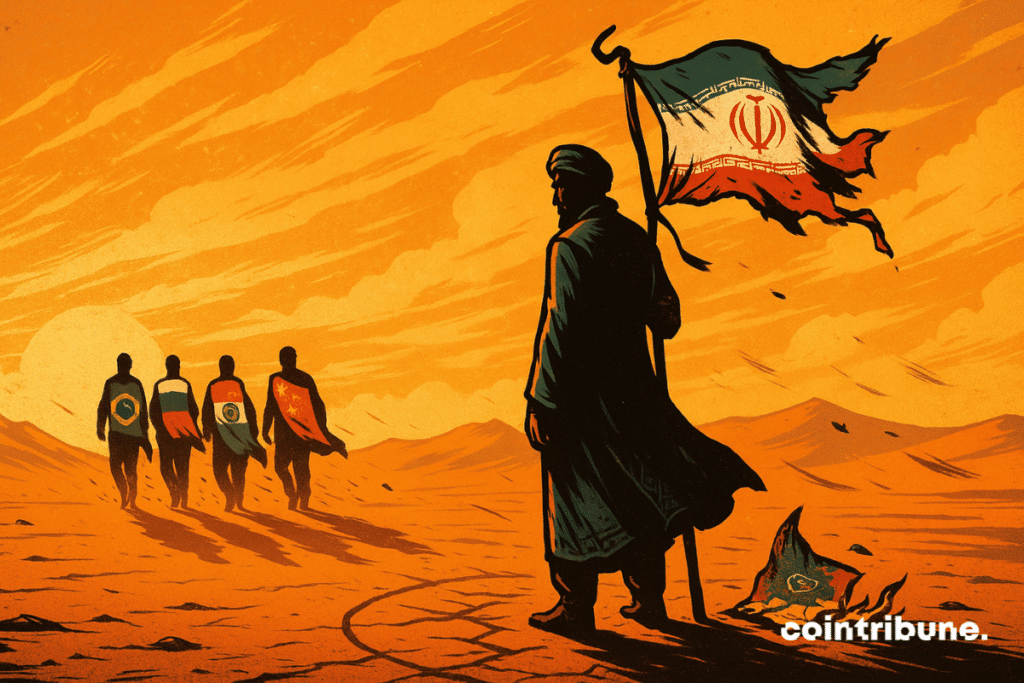BRICS and Iran: Why No Military Support Amid Escalation?
While Israeli strikes target sensitive Iranian sites and Tehran responds with missiles on Tel Aviv, the military escalation is redefining balances in the Middle East. However, a strategic absence intrigues: that of the BRICS. As a new member of the bloc, Iran was counting on solid support against its arch-enemy. Yet neither Moscow, Beijing, nor New Delhi are committing. This silence exposes the limits of an alliance that Tehran viewed as a counterweight to Western hegemony.

In Brief
- The conflict between Iran and Israel intensifies, with unprecedented military strikes on both sides.
- Despite its recent BRICS membership, Iran finds itself alone facing the military escalation.
- Russia condemns Israel but refuses any military support to Tehran, citing a partnership without mutual defense clause.
- Other BRICS members, such as China and India, avoid any involvement, each prioritizing their strategic interests.
Diplomatic Support Without Military Scope
As the specter of a total war confirms, Russia, despite being considered Iran’s most engaged strategic partner, has rejected any idea of military intervention in the current conflict.
In a statement released by the Kremlin, Vladimir Putin did indeed express his “condemnation of Israeli actions, conducted in violation of the United Nations Charter and international law”, and offered his “condolences to the Iranian people for the numerous victims”.
He spoke by phone with Iranian President Masoud Pezeshkian and Israeli Prime Minister Benjamin Netanyahu, calling for de-escalation. However, this stance was quickly accompanied by clarification. Despite the recent signing of a “Strategic Partnership Treaty”, Russia does not intend to provide any military support to Tehran.
This treaty, signed in January 2025 and ratified in the spring, contains no mutual defense clause. It is limited to committing not to support the other party’s enemies.
The reasons for this caution are multiple and rooted in Moscow’s diplomatic strategy. To date, Russia maintains a geopolitical balancing posture to preserve both its regional interests and its room for maneuver vis-à-vis the West. Specifically:
- The Russia-Iran treaty is not a military pact and includes no assistance clause in case of aggression;
- Moscow remains occupied by the war in Ukraine and avoids opening a second front, especially against Israel, a military and nuclear power;
- The Kremlin seeks to maintain dialogue with Washington, notably through its potential mediator role in this conflict;
- Vladimir Putin has repeatedly proposed facilitating a return to the negotiation table, an option publicly welcomed by Donald Trump.
In sum, behind diplomatic language and verbal condemnations, Russia refuses to translate its strategic partnership with Iran into concrete military commitment. This tactical positioning aims to contain escalation but places Tehran de facto in a vulnerable position against Israel.
The BRICS Put to the Test by Their Geopolitical Contradictions
If Tehran could have hoped for collective support from the BRICS alliance, expectations have collided with reality. On June 16, the Iranian Ministry of Foreign Affairs spokesman, Esmaeil Baqaei, stated:
We hope the BRICS will take a position, acknowledging the reality in our region, where a criminal regime launched an illegal armed attack against another country.
However, while the Shanghai Cooperation Organization (SCO) condemned the Israeli strikes, the BRICS released no unified statement. Deep divisions among the members hinder any concerted backstage reaction.
Indeed, China, although close to Iran on the energy front, does not wish to get involved in a conflict that could disrupt its global trade. India, for its part, keeps at a distance from hostility towards Israel, with whom it maintains close security cooperation.
This diplomatic silence illustrates a structural reality: the BRICS are not a security alliance. Thus, unlike NATO, the group has neither a common military doctrine nor coordinated intervention mechanisms.
Each state defends its own national interests, often contradictory, especially in foreign policy. Iran, having joined the group last January, counted on ideological solidarity against the West. However, the reality is more pragmatic. At this stage, none of the bloc’s heavyweights seems ready to jeopardize bilateral relations with Israel or the United States to defend Tehran.
This lack of response raises questions about the BRICS’ political credibility. While it remains a powerful forum contesting the Western model, especially economically as evidenced by the massive disengagement from US assets, its inability to act in a major crisis could eventually limit its strategic reach. For Iran, the isolation is harsh. It faces a large-scale military offensive, yet also lacks solid diplomatic leverage to mobilize its allies. Unless there is a change of posture, unlikely, Tehran will have to face the escalation alone.
Maximize your Cointribune experience with our "Read to Earn" program! For every article you read, earn points and access exclusive rewards. Sign up now and start earning benefits.
Diplômé de Sciences Po Toulouse et titulaire d'une certification consultant blockchain délivrée par Alyra, j'ai rejoint l'aventure Cointribune en 2019. Convaincu du potentiel de la blockchain pour transformer de nombreux secteurs de l'économie, j'ai pris l'engagement de sensibiliser et d'informer le grand public sur cet écosystème en constante évolution. Mon objectif est de permettre à chacun de mieux comprendre la blockchain et de saisir les opportunités qu'elle offre. Je m'efforce chaque jour de fournir une analyse objective de l'actualité, de décrypter les tendances du marché, de relayer les dernières innovations technologiques et de mettre en perspective les enjeux économiques et sociétaux de cette révolution en marche.
The views, thoughts, and opinions expressed in this article belong solely to the author, and should not be taken as investment advice. Do your own research before taking any investment decisions.